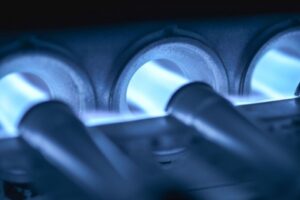2 Major Reasons To Get Your Furnace Serviced The Winter
It’s no secret that this winter has been a particularly harsh one for North Carolina. Early snowfall and plummeting temperatures are prompting many to crank up their thermostats a bit higher this year.
Make sure you’re prepared for Jack Frost’s annual visit and check that your furnace is functioning at its best. Cracks in your heat exchanger can lead to costly repairs, and dangerous—even deadly—consequences if not addressed right away!

- Furnace Fires
If you do not receive routine maintenancechecks on your furnace, your home could be at risk of cracks forming in the heat exchanger. If a crack develops in your heat exchanger, a disproportionate amount of gas and air may mix and result in a furnace fire.
Uncombusted gas is supposed to build up in the heat exchanger to warm the inside and outside walls of the device, while cold air from your home is run along the outside of the newly heated walls. The warmed air is then circulated throughout your home via air ducts while the gases on the inside of the exchanger are sent outside of your home through a vent.
However, if there is a crack in your heat exchanger, these gases can escape into your home through the crack instead of being vented outside and away from your residence. If combustion gases are released into your home, they can easily start what is known as a furnace fire. These fires can be extremely dangerous and unpredictable, and repairing the damage from these fires can be extremely pricey; families spend over $4,500 on average recovering from a furnace fire.
- Carbon Monoxide
Carbon monoxide is well known for being extremely dangerous and even deadly—and for good reason! Odorless, tasteless and colorless, CO cannot be detected by the naked eye.
The heated air that is circulated throughout your home should be free of carbon monoxide, as the heat exchanger is designed to vent combustion gases away from the home. However, if there is a crack in the device, CO could be released into your home.
Three conditions must be met in order for carbon monoxide poisoning to occur via your furnace:
- Gas from inside your heat exchanger must improperly mix with the inside air.
- There must be a crack in your heat exchanger that allows gas to escape into the home.
- The motor that pulls air through the heat exchanger must be functioning improperly.
While it may seem unlikely for all three of these conditions to be met and CO to be released into your home, you’d be surprised by how easily it can happen. If you are unsure of your heat exchanger’s status or worried that it is cracked, call a professional right away to address this potentially dangerous and costly issue.
Keep your family safe this winter and schedule your annual furnace maintenance today. At Comfort First, we want to ensure that every North Carolina home we service is equipped with heating equipment they can count on. Feel free to call us with all your heating needs, even emergencies! 800-279-4822








